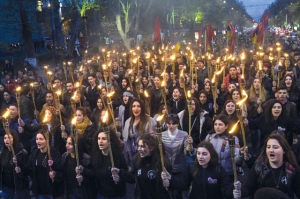US House Votes to Recognize Armenian Genocide
On Tuesday, October 29, in an overwhelming vote of 405 members in favor of the resolution versus 11 opposing it, the US House recognized the Armenian genocide committed by the Ottoman Empire at the beginning of the twentieth century.
Turkey’s past and current steps were in focus in the US House. Prior to voting to recognize the “Armenian issue”, as the Turkish like to call this part of history, the House voted “403 to 16 to impose sanctions on Turkey, in a striking rebuke of Donald Trump after he pulled American forces from northern Syria following a phone call with the Turkish President, Recep Tayyip Erdogan, paving the way for Turkey’s assault on Kurdish-held areas in northern Syria,” the Guardian reports.
The overwhelming voting against Turkey in both cases will most likely damage the image of the US in the eyes of the Turkish people. In a statement, the Turkish Foreign Minister, Mevlüt Çavusoglu, called the act “an attempt to rewrite history” while also touching upon the possible shift of relations between the two countries.
“Undoubtedly, this resolution will negatively affect the image of the US before the public opinion of Turkey as it also brings the dignity of the US House of Representatives into disrepute,” reads the Turkish statement.
The House members, while defending the resolution, pressed the issue quite strongly. House Speaker Nancy Pelosi went on to connect the past of Turkey to the country’s present actions.
“If we ignore history, then we are destined to witness the mistakes of the past be repeated,” said Pelosi, demanding support for the resolution. “Recent attacks by the Turkish military against the Kurdish people are a stark reminder of the danger in our own time.”
Turkish President Recep Tayyip Erdogan on Thursday addressed the US resolution on recognizing the Armenian genocide said to have been committed by the Ottoman Empire, naming the decree which passed in the House of Representatives ‘worthless’ and ‘insulting’.
“I am addressing US public opinion and the entire world: this step is worthless and we do not recognize it,” Erdogan said in a televised speech. “In our faith, genocide is forbidden,” he said. “We consider such an accusation to be the highest insult to our people.”
Erdogan believes that the resolution was politically motivated, in response to the Turkish aggression against the Kurds in northeastern Syria. He also put forward the idea of Turkish Parliament passing a ‘counter resolution’ and further underlined that ‘recognition’ of genocide seriously harms Turkish relations with various actors.
Responding to the House’s decision, President Erdogan said: “We do not recognize this step, this decision you have taken. […] The countries who have stains of genocide, slavery, colonialism in their history have no right to give lessons to Turkey.”
The “Armenian Genocide” has been a fraught debate in history, with the Turkish refusing to recognize it as such and the Armenians demanding the identification of the genocide as a historical fact. Ahmet Davutoglu, the former Prime Minister of Turkey, in his article published in 2014, talked about the impossibility of the ‘just memory’ concept, implying that different nations have different narratives. He suggested the nations move past it, as it is impossible to objectively decide what happened in the past, and to establish diplomatic relations in the present.
The Armenians on their side, with the strong voice of Gerard Libaridian, an Armenian-American historian and politician, responded to the article, calling it an attempt to justify the politics of one’s country and manifesting their inability to see things from the opponent’s perspective.
International politics has taken different standings on what happened in 1915 on the territory of the Ottoman Empire, however, the US House’s Tuesday vote was the first official recognition of the event as a genocide. “The Armenian issue,” or “Armenian Genocide” has been an interesting and controversial issue for researchers and academics alike, while a painful reality for those connected to the events themselves.
By Nini Dakhundaridze with Beka Alexishvili
Yerevan, Armenia. People taking part in a torch-lit procession to mark the 104th anniversary of the Armenian Genocide - the killing of 1.5 million Armenians by Ottoman forces. Source: The Guardian












